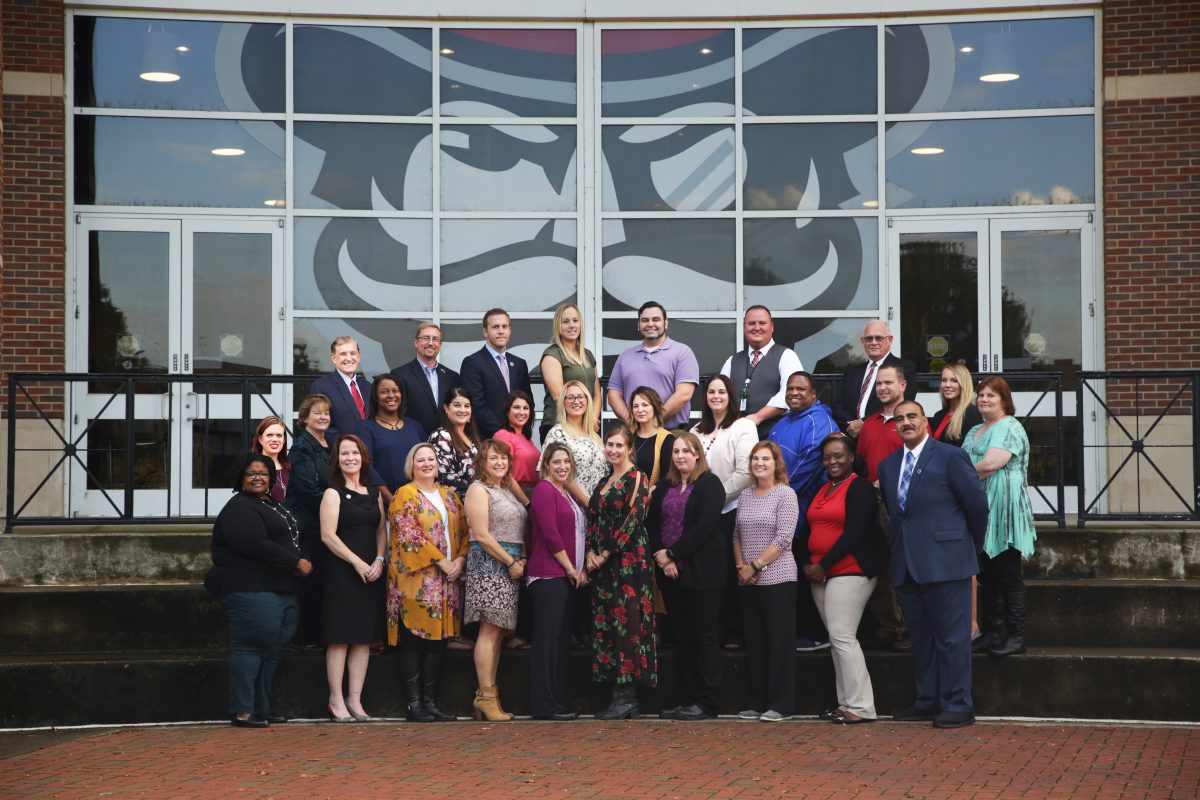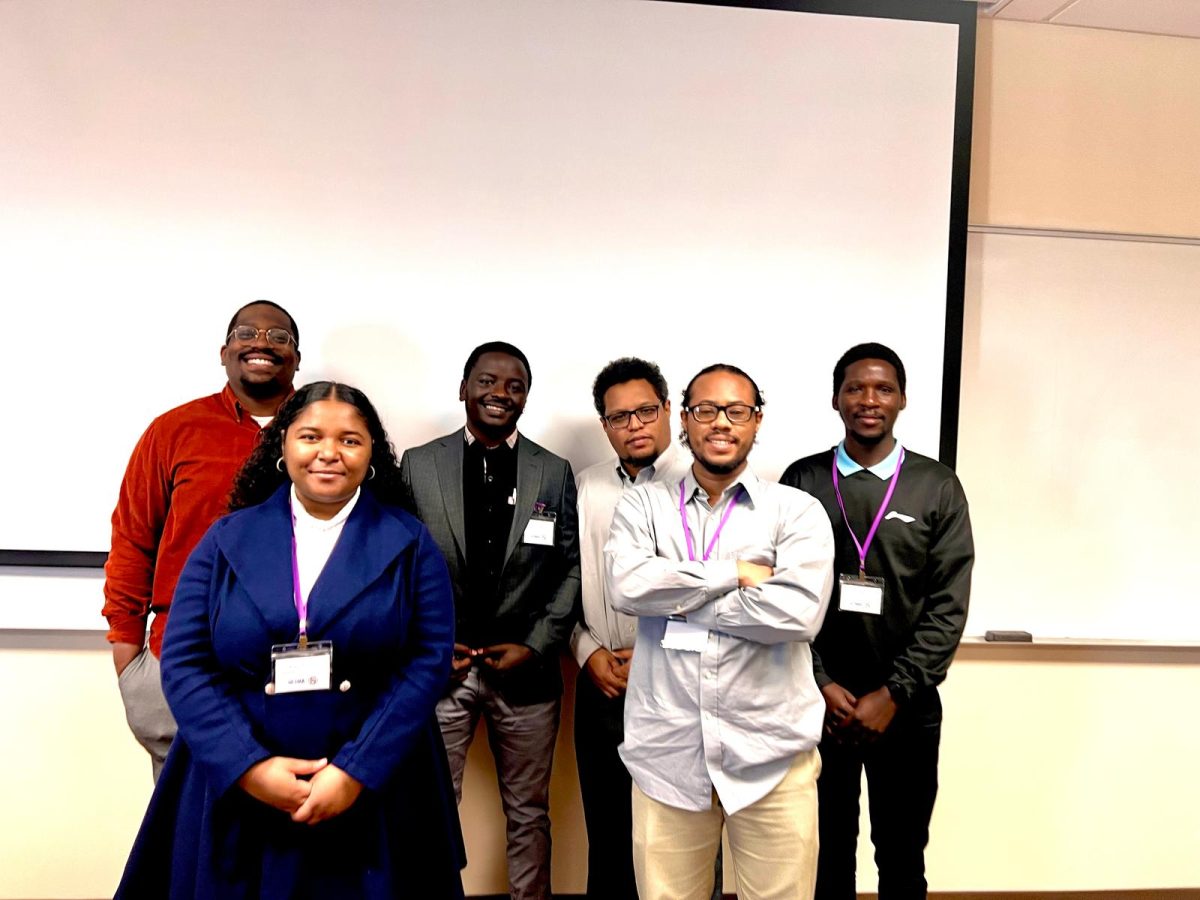The first class of the inaugural doctoral program to ever exist at APSU is in session.
The doctorate, in educational leadership, has brought a whole new kind of student to APSU.
“You work with students who have already achieved at the undergraduate level, who have already achieved at the master’s level. So, they’re outstanding students, to begin with, and the program is rigorous so they are very qualified even to get in. [The] faculty really enjoy working with a student who’s got that level of preparation, to begin with,” President Alisa White said.
The process of getting accepted into the new educational leadership program, a feat only twenty students to date have accomplished, requires an earned master’s degree, graduate degrees with a minimum GPA of 3.25 for master’s degree courses and a minimum cumulative GPA of 3.5 in all educational specialist degree courses.
Additionally, an applicant must have an interview with the doctoral admissions committee, an on-demand essay written during the interview process, three letters of support from a current or former employer describing the applicant’s potential as a leader, a personal philosophy of education, a leadership assessment and successful teaching experience for a minimum of three years prior to taking the initial licensure class, among other requirements.
The program is based on a cohort concept consisting of twenty students. A cohort concept is different from just having twenty people in each class. They work to develop a sense of culture and community within those twenty people to create the mindset for the program.
Ashley Totty, a six year teacher, first generation college student and one of twenty students in the cohort, discussed the difference in being a part of a cohort.
“It’s made us more of a family. When you’re in a master’s program you’re all at a different pace. In this cohort we all started together,” Totty said.
The doctorate is in educational leadership, thus contributing to the long history of educators being trained at APSU.
APSU, as it is now known, began as Austin Peay Normal School when it was created as a two-year junior college and teacher-training institution by Act of the General Assembly of 1927.
While White acknowledges the history of APSU as a school for teachers, she cites the choice of Educational Leadership as the first doctoral program to be due to other reasons.
“We were established more than ninety years ago to train teachers, but I think it’s a lot more than that. I think it’s that K-12 education matters so much to the workforce. It matters so much to the success of students who go onto college. It really matters to the vibrancy and the richness of our entire community,” White said.
Audio Player
White explained that the Clarksville-Montgomery County school system is growing at a very fast rate. With the inclusion of more and more students there is a need for more and more teachers and eventually a need for additional principals.
“They need more principals, and you’ve got to have leaders who can not just work with that particular institution or school campus, but who can be involved in educational policy. So, I think it’s just natural for us because they have a need and there really was no local option,” White said.
By this, White means there was no public option for local teachers to get an education. They either had to go to Nashville to a private school or they had to go to Western Kentucky University. Now, with the inclusion of this new program, however, they can stay right here and get their education.
However, not all of the cohorts cite convenience in terms of location as one of their main reasons for choosing this doctoral program over one from another school.
Totty, who began her undergraduate degree at APSU before transferring to MTSU only to return to APSU for her masters, makes an hour and half commute to her classes each day.
She says it is challenging on top of her job as a full time teacher and the numerous committees she’s a part of at her school, but she sees it as a worthy sacrifice.
“After I left APSU I felt like it was a mistake. When I went back for my masters it was like home to me. When it comes to pursuing this doctoral degree I couldn’t even imagine somewhere else,” Totty said.
Aside from the opportunity this degree offers students, White is also excited for what this program means for the school as a whole.
“I’m excited, number one, that this specific degree is so tied to regional needs. The second thing that is really important to me is what I have seen it do at other institutions that move from a master’s level institution to a doctoral-level institution. There’s a different cachet or brand associated with a doctoral level institution,” White said.
There are numerous hurdles to jump through, not only when creating a whole new program but also in attaining the accreditation the university needs to become a doctoral-level institution as opposed to a master’s level institution. One such hurdle was the accreditation needed from Southern Association of Colleges and Schools Commission on Colleges (SACSCOC.)
SACSCOC is the regional body for the accreditation of degree-granting higher education institutions in the Southern states.
“At the same time, we were getting approval for all the annoyances of our program we were also having to address the university’s issue of accreditation. Future doctoral programs will have less of an issue because we’re going to address all those issues now,” professor Thomas Buttery, Interim Chair of the Department of Educational Specialties said.
After gaining accreditation, the program was started, but SACSCOC still has to visit campus to ascertain how the program is faring before making a recommendation to the board which will hopefully take it up in June. After that entire cycle, APSU will be able to move to propose another degree.
“We’re laying the groundwork for other doctoral-granting colleges in the university. There is already talk about the PsyD program, a Ph.D. there, a nursing Doctorate. So, whatever happens with this program and Southern Association’s approval for us to move to a higher level will be a key component in determining whether or not they get their programs,” graduate coordinator and associate professor Gary Stewart said.
Audio Player
The SACSCOC review team will be here Feb. 5, 6 and 7.
“We’ve laid that groundwork for other colleges to have their doctorates. Somebody had to be first and-” Stewart said.
“-And we were given the opportunity,” Buttery added.
Stewart started working on this doctoral program when he came to APSU in 2005. His first attempt was started in 2006, and he describes it as not as well structured as the program now. He also cites some of the laws of the time for preventing the creation of a doctorate then, chalking it up to bad timing. However, with his second attempt, the program was changed as well as the emphasis. It became much more refined and targeted, and some of those laws went away that prevented APSU in the past.
“In the entire ninety something year history of this school, this is probably the singular most significant event that’s going to elevate APSU to a new threshold within the collegiate ranks of Tennessee and in the south-east. If you’re a doctoral-granting institution, you are no longer a master’s granting institution. You are at a much higher level and with it carries a great level of prestige,“ Stewart said.
“-And funding,” Buttery added.
Another benefit the doctoral program brings to APSU are the professors who come with it as APSU begins to attract faculty who are more interested in working with students at the graduate level or who are only interested in going to a doctoral-level institution.
With benefits, there are also drawbacks. Some of the faculty of the new doctoral program addressed adapting to a new culture and learning how to evolve their program as some of the challenges they face.
“We have a really excellent EDS program, training principals to go out and lead schools in the district. So, one of the challenges was what can we offer them on top of what they’re already getting offered by the EDS program with this doctoral degree,” Associate Dean of Assessment and Accreditation and associate professor John McConnell said.
They discovered that the added benefit of obtaining a doctoral degree was that with a doctorate they are not just consumers of knowledge but creators of knowledge. Whether through their individual research or their dissertations they are becoming the top experts in their areas as doctors of education.
“In developing the new culture, one of the things, one of the struggles that we’ve been dealing with is because the doctoral level mindset is different from that of a master’s or an EDS, and students are having a bit of a struggle moving into that elevated mindset where they’re actually creating knowledge and we’re not just handing it to them,” Stewart said.
There are numerous paths students can pursue after having earned their doctorates. Many go on to be leaders in schools by becoming principals or superintendents. Others take different paths.
“I definitely see myself in higher education. I would like to mentor up and coming teachers … I feel this has made me a stronger leader which I believe has made me a better teacher,” Totty said.
Still, the program is described as under construction, consistently needing new modifications, but as they work towards improving this program and rise to face new challenges, whether in addressing what the elevated expectations are of new doctoral faculty as opposed to graduate faculty or in trying to improve the dynamic between professor and student, they are in fact mirroring what their own students will one day be doing with their degrees.
“In a lot of ways we’re modeling what they will be doing once they start leading schools. They’re going to have to improve the programs of their schools, the culture, the mindset of their institution. So, we have to make sure we do a good job modeling that,” McConnell said.
While the faculty of the new doctoral program is proud of the work they have done and continue to do in the creation of this degree, they want APSU to know this program isn’t just about them. It will have resounding effects across all of campus. From enrollment to funding to programs, this degree will have a long-lasting significant impact on this university.
“This degree doesn’t belong to just us. A doctoral program belongs to the entire university,” Stewart said.
Updated by News Editor.







